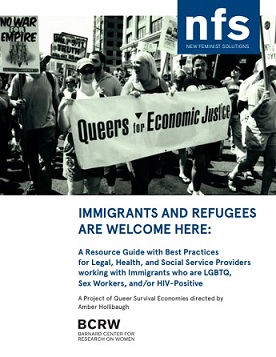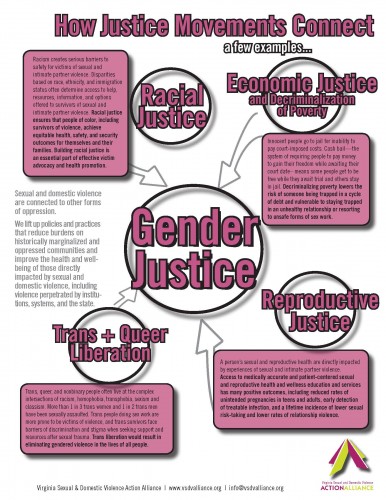Resources Library: Publications/Reports
Start a Search:
Immigrants and Refugees Are Welcome Here: A Resource Guide for Service Providers Working with Immigrants who are LGBTQ, Sex Workers, and/or HIV-Positive

A Project of Queer Survival Economies directed by Amber Hollibaugh, produced with support from the Evelyn and Walter Haas, Jr. Fund
Description
Since the Trump administration took office in January 2017, violence against undocumented and documented immigrants, trans and gender nonconforming people, sex workers, Muslims, Black people and people of color, and other vulnerable groups has increased and taken many forms: economic, political, bodily, sexual, and social. People who occupy multiple marginalized social and structural positions experience these forms of oppression and violence with a sharper edge and more routinely in their everyday encounters. Though communities organize to resist this violence and build networks and systems for sanctuary and self-defense, people who are targeted by vigilante violence, racist policing, laws criminalizing poverty and survival-based economies, and the ramping up of local law enforcement and border enforcement have minimal access to legal recourse, systemic accountability, or reliable safety, reinforcing what are already precarious positions. Because of these conditions, immigrants who are documented and undocumented, LGBTQ, sex workers, and/or HIV-positive face particularly heightened vulnerabilities to violence, detention, family separation, deportation, and premature death.
This resource guide is intended for service providers to improve their competency in assisting clients in these dangerous times, and reduce secondary traumas in their practice. The guide contains a general overview of the landscape and vulnerabilities for immigrants who are LGBTQ, sex workers, and/or HIV-positive, suggestions for service providers in their daily practice, resources for organizational self-evaluation, and a glossary of terms. It is intended as a living document to be used and adapted based on feedback from clients, community members, activists, and service providers, as well as changes to our political landscape.
Table of Contents
- Credits
- Introduction: Understanding the landscape for immigrants who are LGBTQ, sex workers, and/or HIV-positive
- Specific Vulnerabilities
- Laws and Procedures
- Do’s & Don’ts for Service Providers
- Needs Assessments
- Glossary
- Terms Related to Gender and Sexuality
- Terms Related to Gender & Sexuality Oppression
- Terms Related to Immigration
- Terms Related to Sex Work
- Terms Related to HIV
- General Terms
- Resource List
- Organizations
- Reports
- Legal Resources
- Bibliography
Queer Survival Economies was established in 2014 by Amber Hollibaugh to work at the intersections of sexuality, poverty, homelessness, labor, and the criminalization of survival.
From 2014-2016 Amber L. Hollibaugh was a Senior Activist Fellow at the Barnard Center for Research on Women where she directed the Queer Survival Economies project. Hollibaugh is a writer, filmmaker and political activist whose work focuses on feminist, sex, and class politics. Her first book, My Dangerous Desires: A Queer Girl Dreaming Her Way Home (2000), presents over twenty years of Hollibaugh’s writing. Previously, Hollibaugh was the Chief Officer of Elder & LBTI Women’s Services at Howard Brown Health Center in Chicago, the Executive Director of New York’s Queers for Economic Justice (QEJ), Director of Education, Advocacy and Community Building at Services & Advocacy for GLBT Elders (SAGE). Among her health education work, she founded and directed the Lesbian AIDS Project at Gay Men’s Health Crisis in New York, for which she won the Dr. Susan M. Love Award for Achievement in Women’s Health.
The Barnard Center for Research on Women gratefully acknowledges support from the Evelyn and Walter Haas, Jr. Fund.
The Barnard Center for Research on Women engages communities through programming, projects, and publications that advance intersectional social justice feminist analyses and generate concrete steps toward social transformation.
Infographics: How Oppressive Systems Connect and How Justice Movements Connect

Gender-based violence (or the process of controlling, coercing, or otherwise exerting power over someone because of their gender) is both a tool and a driver of white supremacy. Ending gender-based violence requires us to see and dismantle the same forces that support the existence of white supremacy. At the same time, this work calls us to envision and work toward equity and liberation, while breaking out of silos.
The infographic, "How Oppressive Systems Connect" illustrates examples of how gender-based violence is driven by white supremacy, sexism, heterosexism, and capitalism. "How Justice Movements Connect" illustrates examples of how gender justice is supported by movements to build racial justice, economic justice, trans and queer liberation, and reproductive justice.
These resources are helpful for your prevention work, new staff orientation, volunteer training, board training, and other environments where you are exploring the many ways in which work to end sexual and intimate partner violence intersects with work to build racial justice, reproductive justice, economic justice, and trans and queer liberation.
Intersectionality of Forced Marriage with Other Forms of Abuse in the United States
In the United States, forced marriage can impact individuals of any age, gender, socio-economic status, ethnic or religious background. In a 2011 survey, service providers in the U.S. (primarily legal and social service agencies in the domestic violence and sexual assault field but also including law enforcement, school and university staff, counselors and other legal professionals) reported encountering as many as 3,000 known or suspected cases of forced marriage (Tahirih Justice Center, 2011). The current article is a follow up looking at the intersectionality of other forms of abuse and forced marriage.
Intimate Partner Violence Meets Immigrant and Refugee Issues Fact Sheet
Published by the National Immigrant Family Violence Institute, Intimate Partner Violence Meets Immigrant and Refugee Issues provides an overview of specific issues and barriers to services that impact effective advocacy and service provision. This brief fact sheet addresses differences in family dynamics, culture, and marriage traditions that will affect the ways in which immigrant and refugee women will seek out and respond to services.
Investing in Prevention
The Action Alliance and Virginia's General Assembly are committed to ensuring the expansion of funding for primary prevention of sexual and intimate partner violence to confront and uproot the direct causes of violence. This year, we were successful in establishing $750k in new funding for primary prevention with the hopes of broadening and strengthening prevention work beyond federal funding streams.
On May 18th, the Action Alliance hosted a session on Investing in Prevention via the Directors’ Forum to discuss more about the essential components of primary prevention, how primary prevention complements and connects with intervention services, what the CDC means when it uses terms like “community-level strategies” and “layered approaches”, and more! One of the things we love most about primary prevention work is its hopefulness, inventiveness, and adaptability. If you aren’t already inspired by the world of primary prevention, check out the recording and resources from the forum!
View the May 18th Directors’ Forum Zoom recording (and download the slide deck below)
Access the Jamboard for the “Speedy Town” activity (which includes tips on identifying “downstream” and “upstream” approaches)
“Prevention Toybox” from the Indiana Coalition Against Domestic Violence - a fantastic resource from which we borrowed the Speedy Town activity (with permission)!

